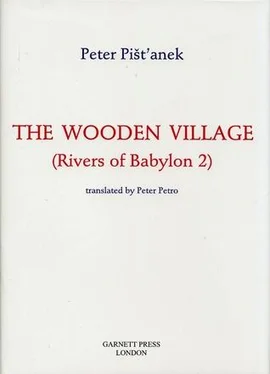Peter Pišťanek - The Wooden Village
Здесь есть возможность читать онлайн «Peter Pišťanek - The Wooden Village» весь текст электронной книги совершенно бесплатно (целиком полную версию без сокращений). В некоторых случаях можно слушать аудио, скачать через торрент в формате fb2 и присутствует краткое содержание. Год выпуска: 2008, Издательство: Garnett Press, Жанр: Современная проза, на английском языке. Описание произведения, (предисловие) а так же отзывы посетителей доступны на портале библиотеки ЛибКат.
- Название:The Wooden Village
- Автор:
- Издательство:Garnett Press
- Жанр:
- Год:2008
- ISBN:нет данных
- Рейтинг книги:3 / 5. Голосов: 1
-
Избранное:Добавить в избранное
- Отзывы:
-
Ваша оценка:
- 60
- 1
- 2
- 3
- 4
- 5
The Wooden Village: краткое содержание, описание и аннотация
Предлагаем к чтению аннотацию, описание, краткое содержание или предисловие (зависит от того, что написал сам автор книги «The Wooden Village»). Если вы не нашли необходимую информацию о книге — напишите в комментариях, мы постараемся отыскать её.
The Wooden Village — читать онлайн бесплатно полную книгу (весь текст) целиком
Ниже представлен текст книги, разбитый по страницам. Система сохранения места последней прочитанной страницы, позволяет с удобством читать онлайн бесплатно книгу «The Wooden Village», без необходимости каждый раз заново искать на чём Вы остановились. Поставьте закладку, и сможете в любой момент перейти на страницу, на которой закончили чтение.
Интервал:
Закладка:
“ Apuci! Daddy!” Eržika shouts and weeps, as she throws herself at her father.
Old Kišš pushes her away.
Feri Bartaloš stands there, his eyes stubbornly focused on the floor.
“Eržika!” shouts Mrs Kišš, running in from the yard. She embraces her daughter with both arms and her son-in-law with her eyes. Then she fixes her husband with a searing look. “Antal!” she shouts at him sternly. “Welcome your daughter!”
The old man stands in the middle of the room, trying to put the cigarette in its holder. His big belly and trembling hands make it impossible.
“Antal!” Mrs Kišš shouts.
“ Apuci! ” whimpers Eržika.
Kišš puts the cigarette holder in his mouth.
“Run them a bath; they can get washed,” he orders his wife in a voice that is harsh, but just a little moved. “They stink. Give them something to wear. Feed them. And then they can sweep the whole yard. I won’t feed them for nothing.”
Old Kišš walks past his old wife and Eržika as if he was walking past a group of statues.
Feri is still standing in the doorway.
“If you don’t mind,” says the butcher harshly, averting his gaze.
Proud Feri steps aside, and Kišš walks outside.
“Thank you, Father!” Feri says quietly.
Startled, Kišš gives Bartaloš a hard, silent gaze. Then he goes out.
“Where’s he gone?” asks Eržika.
“He’s gone out riding,” says Mrs Kišš. “Whenever anything bothers him, he saddles the horse that Rácz gave him and rides over the fields. But come, you must both be hungry!”
* * *
In the evening the Kišš family goes to bed. The old man lies down and covers himself with the eiderdown. He closes his eyes and stubbornly refuses to talk.
“Aren’t you interested in what they’ve been through in the city?” his wife asks him.
The old man keeps quiet and pretends to be asleep. Only his trembling eyelids give him away.
“They even had a daughter,” said the old woman. “As beautiful as a picture. Her name was Lady…”
“What?” the old man asks and opens his eyes.
“Lady,” says the old woman, glad that he’s showing interest.
“Odd name,” says Kišš. He immediately regrets being caught out and closes his eyes again.
“That was the name of a woman friend Eržika had,” the old woman says. “Later, her friend died,” she adds, but the old man doesn’t react this time. “And Lady was kidnapped by some Germans,” the old woman continues, watching old Kišš’s eyelids quivering. “They both suffered a lot. And you’re as hard as nails: hard, and unbending. And unfair.” Old Mrs Kišš sighs. “My heart bleeds when I think that my granddaughter, whom I haven’t even seen, was kidnapped!” she says. “Eržika’s suffered a lot. Why can’t you forgive her? Why won’t you accept her?”
“They failed,” the old Kišš says, without opening his eyes, as if surfacing from deep sleep. “They failed. Why didn’t they make it? That stupid Rácz made it. So why couldn’t Feri Bartaloš and my daughter?”
“How do you know they didn’t make it?” the old woman retorts. “They made lots of money; they meant to open a boutique here…”
“What’s a boutique?” Kišš stops her.
“It’s a sort of shop,” says Mrs Kišš. “Like our clothes shop Spring over here. They made a million. But they lost it. They were robbed.”
“Ha! A million?” Kišš laughs condescendingly, as if to himself. “Is that what they told you?”
“I believe my daughter,” says Mrs Kišš. “She’s never lied to me.”
“Go to sleep now,” says Kišš. “We’ll see what use they are. If they made a million, then so be it.”
Old Kišš gets up, feels for his slippers with his feet and with a heavy step leaves the bedroom. He heads for what used to be Eržika’s bedroom. A light is shining under the door. Kišš knocks loudly and enters. Stern and huge in his nightgown, he stands in the doorway. Eržika and Feri are lying next to each other, their hands bandaged: the broom handles have taken the skin off.
“Eržika, on Monday you start in my butcher’s shop,” says Kišš. “Selling at the counter. That will be your boutique: pork neck, tenderloin, sirloin.”
His turbid gaze moves to his son-in-law.
“And for you, Ferenc,” says Kišš, “I have a place at the pig farm that I’ve just set up You’ll start at the bottom. We’ll see what you’re made of. If you try hard and show you’re smart, maybe in time you’ll work your way up to being chief swineherd!”
Eržika jumps out of bed and covers her father’s hard hand with kisses of gratitude.
* * *
It gets light early. Around five, when the shift ends in Justine, day has usually broken. Sida sits down, throws her wig off, discards her tall boots and puts her long black-stockinged legs up on the rack. She lights a cigarette with pleasure. “Would you like one?” she asks Piggybank and moves the pack to him. She concentrates on detaching the artificial nails, blood-red and as long as talons, from her real ones. Freddy lights up and, with one eye closed, tidies up the torture room equipment.
“What a night!” says Sida, gets up and goes to take a shower.
While Tešadíková is in the bathroom, Freddy cleans the torture room, carefully wipes the instruments and gets everything ready for the evening. Then he, too, takes a shower. The hot aroma of Sida’s shampoo lingers in the cubicle. Freddy soaps himself, showers, and puts his everyday clothes on.
“Are you coming?” asks Sida, now dressed in patched jeans and a thick leather jacket. She wears hand-made cowboy boots and has a motorcycle helmet over her shoulder. Her short ash-blonde hair is freshly combed and her face has no trace of make-up. Freddy still hasn’t got used to this morning transformation. In her everyday clothes his mistress reminds him very strongly of the old Daughters of Death times and the camp sites in the woods, so much so that only with the greatest effort can Piggybank suppress the painful emotion and excitement.
“I can drop you off at the New Bridge,where you can catch the 101, if you like,” says Sida, and Freddy, as always, gratefully accepts.
In the courtyard of the Perverts’ Centre Tešadíková’s Honda 750 Magna is parked. Sida lowers the stand, straddles the huge fuel tank and starts the engine. “Coming?” she asks her slave and puts on her helmet. Freddy doesn’t keep her waiting, mounts the high seat behind her and embraces her firmly around the waist with both arms. This, their sole non-professional intimacy, always makes him feel odd. Sida’s waist radiates pleasant warmth and Freddy can’t believe that it is the same person with whom he spends entire nights whipping, burning, hanging, impaling, racking, crucifying and otherwise tormenting dozens of randy perverted customers.
Sida revs the engine and the powerful motorcycle rushes wildly onto the street. Freddy has to hold on to her waist tighter if he is not to fall onto the pavement. He is looking forward to his bed.
* * *
Freddy’s father, his face yellow from cigarette smoke, sits in the kitchen chain-smoking. The window is closed; Freddy’s parents hate draughts. They air the place by equally distributing the smoke everywhere. You can smell the tobacco that infuses the carpets, curtains, tablecloths and every item of furniture. The Mešťánek house by Nová Ves pond announces its presence from afar by its striking tobacco smell.
Old Mešťánek worries about his son. He can’t understand why he has to have an abnormal offspring. Everyone else nearby is quite normal, only Mešťánek’s son has to be a pervert.
And yet, when Freddy was a child, he was interested in quite normal pastimes: he collected postage stamps, flags of football teams, and had a herbarium. All his childhood hobbies were modest; they had to be, since the Mešťáneks were building a house and every crown went on buying bricks, and so on. If Freddy got a modest gift for his birthday, name day, or Christmas — handkerchiefs, wool for a pullover, shirt, or shoes — he was overcome by joy. He ran around the living room with an expression of disbelief and then ended by trying to crown his joyful and stormy amazement by rolling on the floor and doing clumsy somersaults.
Читать дальшеИнтервал:
Закладка:
Похожие книги на «The Wooden Village»
Представляем Вашему вниманию похожие книги на «The Wooden Village» списком для выбора. Мы отобрали схожую по названию и смыслу литературу в надежде предоставить читателям больше вариантов отыскать новые, интересные, ещё непрочитанные произведения.
Обсуждение, отзывы о книге «The Wooden Village» и просто собственные мнения читателей. Оставьте ваши комментарии, напишите, что Вы думаете о произведении, его смысле или главных героях. Укажите что конкретно понравилось, а что нет, и почему Вы так считаете.












